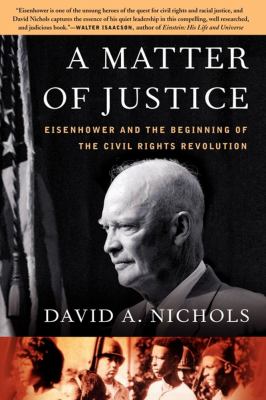
Book
|
A matter of justice : Eisenhower and the beginning of the Civil Rights revolution
Copies
1 Total copies, 1 Copies are in,
0 Copies are out.
Title
A matter of justice : Eisenhower and the beginning of the Civil Rights revolution
Call No
E836 .N53 2007
Edition
1st Simon & Schuster paperback ed.
Subjects
Eisenhower, Dwight D. (Dwight David), 1890-1969--Political and social views.
Eisenhower, Dwight D. (Dwight David), 1890-1969--Relations with African Americans.
Eisenhower, Dwight D. (Dwight David), 1890-1969. fast (OCoLC)fst00037714
African Americans--Civil rights--History--20th century.
Civil rights movements--United States--History--20th century.
African Americans--Legal status, laws, etc.--History--20th century.
Civil rights--United States--History--20th century.
School integration--United States--History--20th century.
Presidents--United States--Biography.
African Americans--Civil rights.
African Americans--Legal status, laws, etc.
Civil rights.
Civil rights movements.
Political and social views.
Politics and government
Presidents.
Race relations.
Relations with African Americans.
School integration.
United States--Race relations--History--20th century.
United States--Politics and government--1953-1961.
United States.
Biographies.
History.
Eisenhower, Dwight D. (Dwight David), 1890-1969--Relations with African Americans.
Eisenhower, Dwight D. (Dwight David), 1890-1969. fast (OCoLC)fst00037714
African Americans--Civil rights--History--20th century.
Civil rights movements--United States--History--20th century.
African Americans--Legal status, laws, etc.--History--20th century.
Civil rights--United States--History--20th century.
School integration--United States--History--20th century.
Presidents--United States--Biography.
African Americans--Civil rights.
African Americans--Legal status, laws, etc.
Civil rights.
Civil rights movements.
Political and social views.
Politics and government
Presidents.
Race relations.
Relations with African Americans.
School integration.
United States--Race relations--History--20th century.
United States--Politics and government--1953-1961.
United States.
Biographies.
History.
Language
English
Published
New York : Simon & Schuster, 2008,2007.
Publication Desc
353 pages, 8 unnumbered pages of plates : illustrations ;
ISBN
9781416541516
(pbk.)
Target Audience
Unknown or not specified
Dimensions
25 cm









